calsfoundation@cals.org
Lion Oil Company
Lion Oil is an El Dorado (Union County) corporation that refines and produces oil, gasoline, and other oil-based products. Its products include not only fuels and asphalt but industrial solvents and oil-based roofing products. Lion is a major employer in southern Arkansas, with more than 500 employees.
When the oil boom began in southern Arkansas in 1920, Colonel Thomas Harry Barton, a Texas native, came to El Dorado and began investing in the emerging industry, organizing the El Dorado Natural Gas Co. In 1922, he took over a small refinery in El Dorado that became the Lion Oil and Refining Co. Initially, the refinery produced 2,000 barrels per day and employed twenty-five people. Reportedly, Barton decided to call the company “Lion Oil” because of his fondness for wordplay; the name of the company is a palindrome, spelled the same forward and backward.
The next year, the company was incorporated as Lion Oil Refining Co. The company grew rapidly. The 1923 discovery of the Smackover Field just to the north of the booming oil fields around El Dorado added to the oil frenzy across southern Arkansas. Lion Oil quickly acquired 1,600 acres of leases in Smackover (Union County) that produced between 10,000 and 12,000 barrels of oil each day; it also built a twelve-mile pipeline from Smackover to the El Dorado refinery. Lion Oil had quickly become one of the largest producers and largest refiners of oil in Arkansas. Capacity at the refinery soon expanded to 10,000 barrels per day. In the first six months of 1925, Lion Oil had eighty-five wells producing a total of 1.4 million barrels of oil. Company assets now stood at more than $7.5 million.
In 1929, Lion Oil expanded into wholesale marketing of oil, making it a fully integrated organization. The company also moved into gasoline sales. By 1932, Lion Oil operated 441 service stations. In 1935, the company continued to expand with the purchase of the Arkansas properties of Marathon Oil, adding twenty-nine bulk plants and 375 service stations to its holdings. In 1939, Lion Oil became the first Arkansas corporation to be traded on the New York Stock Exchange (NYSE).
Preparations for World War II began in the early 1940s as the federal government initiated a peacetime draft, expanded the military, and began building new ammunition plants. Lion Oil organized a subsidiary in 1941, which became the Ozark Ordnance Works, to manufacture anhydrous ammonia, a material used in explosives. The government took over operations at the plant during the war. In 1946, Lion Oil bought the Ozark Ordnance Works from the federal government and converted it to production of ammonia and nitrogen fertilizers in addition to synthetic chemicals from natural gas. The company officially changed its name to “Lion Oil Co.” and boasted $22 million in assets.
In 1955, Lion Oil was merged with Monsanto Chemical Co., a corporation based in St. Louis, Missouri. At this point, Lion employed 3,000 people and had assets of $150 million. Barton himself served on the board of directors of Monsanto until his retirement in 1959.
Lion Oil service stations became a common feature along roadsides in the South. At their peak in the mid-1950s, nearly 2,000 Lion service stations dotted the region. In the 1960s, this gave rise to the popular “Beauregard Lion” mascot in Lion advertisements. However, by the 1970s, Monsanto had integrated the company into its operations, and the Lion identity began to disappear. Monsanto slowly sold off many elements of the old company, shutting down the service stations, and employment dropped. In 1975, Monsanto sold the oil refinery to California-based Tosco. By this time, not even the refinery was referred to as “Lion.”
The situation worsened for the El Dorado refinery. By 1983, Tosco had suffered a downturn and nearly shut down the El Dorado facility. Local oil producers scrambled and, in 1985, enticed Ergon Corp. of Jackson, Mississippi, to buy the refinery from Tosco. Ergon revamped and expanded the El Dorado refinery and restored the Lion name to the facility. Lion Oil’s fortunes began to soar once again. With the new partnership with Ergon, Lion began expanding into less-polluting oil products. By 1989, the Lion Oil refinery employed 400 people, refined 50,000 barrels of oil per day, and produced unleaded fuels and more than 150 asphalt products.
In the 1990s, this environmental direction turned to Union County’s Sparta Aquifer, which was being depleted because of overuse by residents and industry alike. Lion Oil and Great Lakes Chemical, a nearby chemical plant, worked together to reuse 2 million gallons of wastewater each day instead of using aquifer water, an effort that earned the two companies the 2002 Corporate Conservationists of the Year Award from the Arkansas Wildlife Federation. By late 2004, Lion Oil had ceased using aquifer water and began instead relying on river water to ensure that the aquifer could adequately recharge itself.
By the beginning of the twenty-first century, Lion Oil had become a leading producer of low-polluting, low-sulfur fuels. By 2006, the company was producing 500 million gallons of gasoline, 375 million gallons of diesel fuel, and 150 million gallons of asphalt per year, earning more than $1 billion annually. On March 21, 2011, Delek US Holdings, the American branch of the Israeli-based Delek Group, announced that it was acquiring a majority interest in Lion Oil for $95 million in cash and stock. By October 2011, it owned 100 percent of the company.
For additional information:
Donald, Leroy. “Lion Oil Starting to Roar.” Arkansas Gazette. June 19, 1989, pp. 1C, 5C.
Fowler, John F. Lion Oil. New York: Industrial Publication Co., 1925.
Lion Oil. http://www.lionoil.com/index (accessed February 28, 2022).
“Lion Oil: The Mouse That Roars.” Focus: An Ergon Perspective on Quality 11 (Winter 2006): 8–9.
Kenneth Bridges
South Arkansas Community College
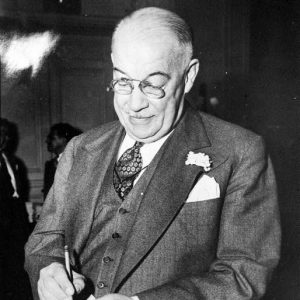 T. H. Barton
T. H. Barton 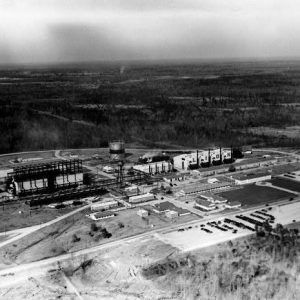 El Dorado Oil Company
El Dorado Oil Company 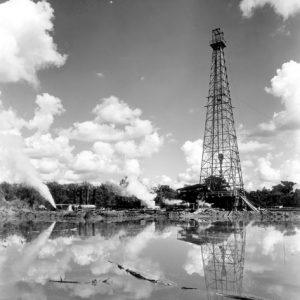 El Dorado Oil Rig
El Dorado Oil Rig 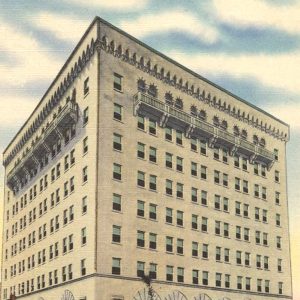 Exchange Bank
Exchange Bank 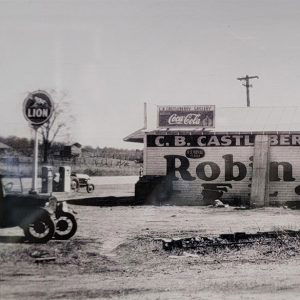 Lamar Grocery
Lamar Grocery 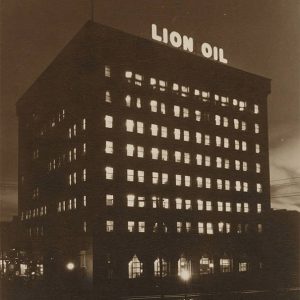 Lion Oil Building
Lion Oil Building 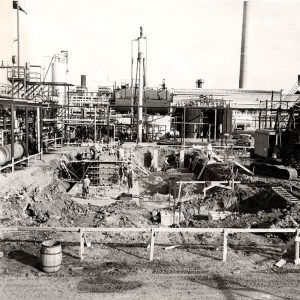 Lion Oil Construction
Lion Oil Construction 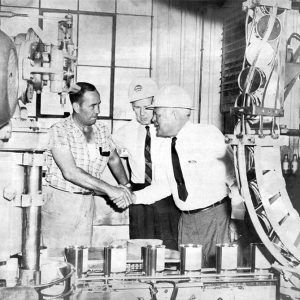 Lion Oil Employees
Lion Oil Employees 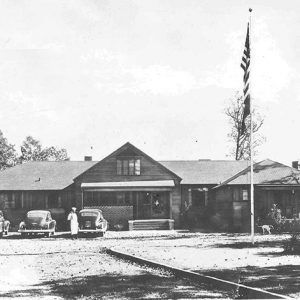 Lion Oil Lodge
Lion Oil Lodge 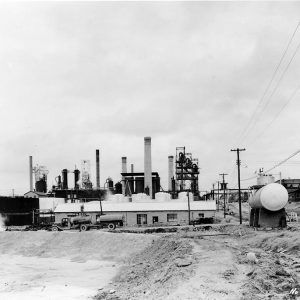 Lion Oil Pump House
Lion Oil Pump House 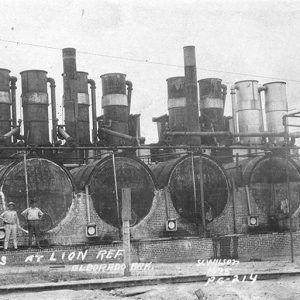 Lion Oil Stills
Lion Oil Stills  Lion Oil Stills
Lion Oil Stills 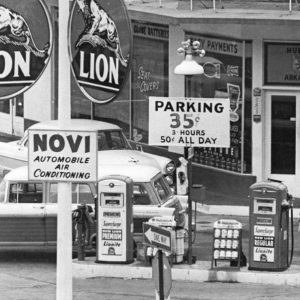 Lion Service Station
Lion Service Station 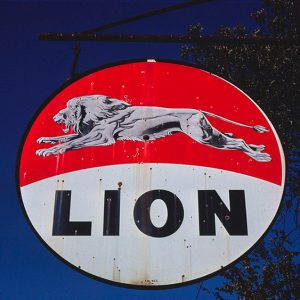 Lion Sign
Lion Sign 



My dad, Decimus Cates, was an accountant with Lion Oil. When Monsanto took over, he was transferred to St. Louis, Missouri.
My grandfather Charles H. McGough was one of the linemen on the pipeline from Smackover to El Dorado in 1954.
My grandfather, Claude R. McGinnis, and his step-father, George Sonricker, built the original refinery in 1921.